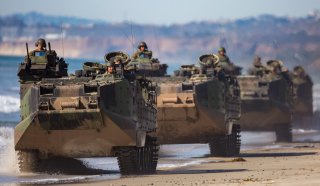Ready for Action: Marines Practice Littoral Combat Tactics in Hawaii
The 3rd MLR organized itself into three command and control groups that “refining standard operating procedures to employ and enable fires, support maritime domain awareness, and establish and sustain expeditionary sites to support joint campaigning across the competition spectrum.”
The newly-redesignated 3rd Marine Littoral Regiment and the Marine Corps Tactics and Operations Group wrapped up Exercise Spartan Trident earlier this month. The three-part exercise “facilitated the development and refinement of tactics, techniques, and procedures required to serve as the inaugural Marine Littoral Regiment.”
A Marine Corps statement explained that the Spartan Trident “allowed the 3rd MLR and its subordinate units to rehearse command and control and focus internally on processes and procedures to refine how the MLR will operate in the future.”
It added that “the 3rd Marine Littoral Regiment, based on Marine Corps Base Hawaii, is task-organized to act as part of a stand-in-force and disrupt an adversary in a contested littoral environment through reconnaissance, counter-reconnaissance, and sea denial operations in support of a maritime campaign.”
“The Spartan Trident series was an important opportunity for us to train alongside the joint force through a realistic, combined scenario,” said Col. Timothy S. Brady Jr, 3rd Marine Littoral Regiment Commanding Officer. “These training opportunities allow us to strengthen our internal tactics, techniques, and procedures to ensure we remain ready.”
The first part of the three-part exercise involved what the Corps called “interactive discussions” that involved “command relationships, kill web requirements,” and “detailed mission essential task lists.”
The second part of the exercise involved a week’s worth of planning for the next week’s training, “designed to test the 3rd MLR’s concept of employment in a realistic all-domain environment.”
The last part of the Spartan Trident exercises involved “refining standard operating procedures to employ and enable fires, support maritime domain awareness, and establish and sustain expeditionary sites to support joint campaigning across the competition spectrum.”
The 3rd MLR organized itself into three command and control groups that “refining standard operating procedures to employ and enable fires, support maritime domain awareness, and establish and sustain expeditionary sites to support joint campaigning across the competition spectrum.”
Though the 3rd Marine Littoral Regiment is not new, its recent redesignation highlights the Marine Corps’ shift from a primarily land-based force optimized for wars in the Middle East to a lighter and more nimble force able to operate at sea.
A simple name change is by no means the only adjustment in store for the Marine Corps. They’ve also divested all tank battalions, as well as much of their tube mortars and artillery since these platforms would struggle in a maritime environment. In any case, the changes the Marine Corps is implementing require practice to perfect—and the Corps is charging forward.
Caleb Larson is a multimedia journalist and defense writer with the National Interest. A graduate of UCLA, he also holds a Master of Public Policy and lives in Berlin. He covers the intersection of conflict, security, and technology, focusing on American foreign policy, European security, and German society for both print and radio. Follow him on Twitter @calebmlarson.
Image: DVIDS.

